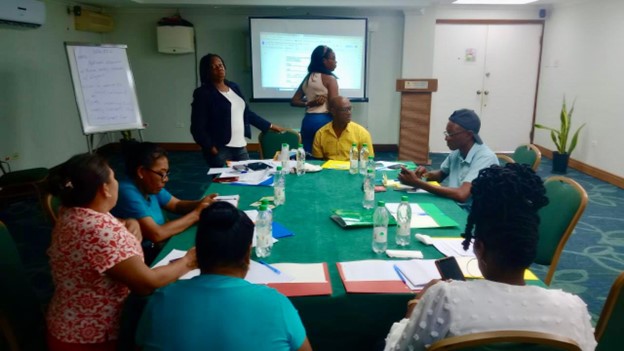FAO,PROCASUR and IFAD facilitates the dialogue between Farmers' Organizations networks to share experiences and perspectives on strengthening the sector’s capacities
This Thursday, April 24, 2024, a meeting was held in Georgetown between farmers' organizations representatives to discuss strategies to foster better coordination and establish a National Association of Family Farmers in Guyana.

National Network of Family Farming
©FAO
Georgetown - Within the framework of the Farmers Organizations for African, Caribbean and Pacific Programme(FO4ACP), an initiative that FAO is implementing in the Caribbean in partnership with Procasur Corporation and the International Fund for Agricultural Development (IFAD) with the support from the European Union, representatives from farmers’ organizations from the different regions of Guyana met to share experiences, needs and perspectives on strengthening their organizational and productive capacities and to formalize the creation of a consortium of farmers’ organisations with the goal of sustaining the work of rural family farmers through climate smart agriculture.
Gillian Smith, FAO representative in commenting on the impact of the programme to date stated that “The reality is, when we can collectively pool our resources and skills in an efficient and organized way, we see amplified benefits within our homes, communities and institutions. Initiatives such as FO4ACP provide a strong case study which shows how working together with access to tailored tools in an organized way can contribute to efficient and economically feasible group dynamics. It is great to see countries like Guyana who have always had a long rich history of farmers’ organisations, benefitting from these opportunities to further empower, sustain and advocate for themselves.
Resulting from their participation in national and regional exchanges with other farmers’ organisations, the 8 targeted groups have formally organized themselves into this Association as an innovative idea that would advocate for family farming in Guyana.
This activity consolidate a work that started with the 1st National Learning Route promoted by the Programme and a Regional activity organized in Colombia, where representatives from Guyanese Farmers’ Organizations could learn from other countries’ experiences in developing associations and cooperatives.
Recognising the vast geographical distances between the organisations, Thursday’s engagement which was the first in-person meeting of the Association and focused on four key topics: access to markets, development of productive capacities, financing and support services, coordination with public policies and rural development initiatives within the context of drawing mutual benefits as an Association of Farmers’ Association as opposed to individual groups.
Althia Anesa Giles, a member of the Pomeroon Exporters and Producers Association (PEPA), stressed that the meeting was a very important event in her country's agricultural sector, giving birth to a new level of articulation:
“All the people who are part of this of the National Network of Small Family Farmers or part of the executive body are representatives and parts of the association of small family farmers, so I think it is a great idea. It means that we would have direct dealings with the farmers, which would allow us to know their situation, because we would certainly know what we have to do to relieve these farmers. If we are intimately involved it means that we are going to do our best and that we can find a solution. In addition, the fact that we have the technical and financial backing of renowned organizations such as PROCASUR and FO4ACP seems to me to be a great advantage in bringing relief to our families”.
Andora Forde-Crandon, representative of the Gibraltar/Fyrish Farmers Association said that the collective agenda of the national network should move towards "We gathered eight groups of family farmers who participated in the Guyana Learning Route, in order to form the National Association of Rural Family Farming in Guyana. So we started with the formation of the executive body to formalize the rules, the constitution and move forward together with the registration of different organizations and thus meet the needs of each of the family organizations that require it”.
Pedro Boareto, Regional Coordinator of the FO4ACP project, stated that the fostering national networks and cooperation between the different smallholder farmers’ organizations is a very important component of the strategy implemented by FAO within the FO4ACP and also in the implementation of the United Nations Decade on Family Farming.
Boareto believes that associativity is key to achieving the goals of each farmers' organization and believes that the next steps of the agricultural sector in Guyana should accompany this process of articulation and integration.
“Promote and facilitate dialogue spaces between the organizations is crucial when discussing mechanisms to develop their capacities. We need to generate opportunities for them to share their knowledge and learn from their peers while developing a common framework that promotes their associativity and collective work”.
About the FO4ACP Programme
This initiative is part of the Farmers' Organizations for
Africa, the Caribbean, and the Pacific (FO4ACP) program, financed by the
International Fund for Agricultural Development (IFAD) and the European Union
in support of the Organization of African, Caribbean, and Pacific States
(OACPS). It aims to increase incomes and
improve the livelihoods, food, nutrition security, and safety of organized
smallholder and family farmers in African, Caribbean, and Pacific countries by
strengthening regional, national, and local farmers' organizations.
Contact
José Negrón Valera Communications specialist [email protected]
